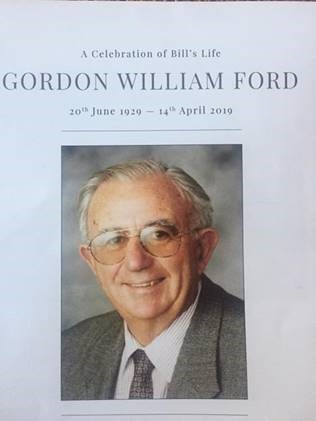Farewell to Professor Bill Ford, our teacher, mentor and friend for many decades
Farewell to Bill Ford: Pioneer of Industrial Relations Research and Teaching (1929–2019)

Bill Ford was a pioneer scholar and activist in industrial relations who has left a rich legacy in relation to all aspects of work and employment studies. He was an academic whose ideas had a practical impact. Bill was one of the founders and the inaugural President of the Association of Industrial Relations Academics in Australia and New Zealand (AIRAANZ). For many years, he was a leading figure in industrial relations and organisational behaviour at the University of New South Wales (UNSW) and throughout Australia. He helped establish trade union education, served on a number of significant government inquiries and was involved in many innovative workplace reforms in Australia and overseas. Bill was awarded an Order of Australia (AM) in 2005 for ‘service to industrial relations, particularly through the development of the theory and practice of workplace reform, to the establishment of industrial relations as a field of study in Australia, and as a contributor to community organisations.’
Bill had a strong sense of social justice which underpinned his life and achievements. He was a mentor to many younger academics, including the authors of this tribute. He was willing to participate in forums and debate ideas, often challenging the prevalent orthodox views of employers, trade unions and governments, as well as academics. Perhaps Bill’s greatest talent and contribution to Industrial Relations was his insights into areas of research and scholarship long before they become mainstream areas for academics and governments to research and debate. In particular, Bill drew our attention to the importance and impact of issues such as migrant workers in Australia, technological change, skills and learning, the workplace and organisational change. While the orthodoxy of industrial relations research at the time was primarily concerned with the institutions of our IR system, Bill raised issues that were not on the table at the time. Bill opened the way for a future generation of researchers to build careers in areas of research that he identified as important and transformational.
In many ways, Bill was not a traditional academic. While publishing many valuable papers over many years, Bill did not seek out the traditional academic journals and forums. His audience went beyond academia. As a result of not ‘playing the game’ Bill was never offered a University Chair and perhaps never received the recognition for his originality and contribution to ideas that he deserved. In his later career as a consultant to industry in Australia and beyond, practitioners and policy makers recognised his unique contribution and talents and he was widely sought by organisations and Governments.
Bill Ford was born and grew up in Millers Point, Sydney, among extended families of waterfront workers. He left school at 15 years of age and worked in a wide range of jobs in factories and oil refineries. After achieving his Leaving Certificate in his early 20s, he was awarded a teacher’s scholarship to Sydney University where he gained an honours degree in History. Awarded a Fulbright Postgraduate Scholarship in 1958, he studied at the University of Illinois and then transferred to UCLA where he gained an MA. During his years in the US, Bill became involved in the Civil Rights Movement and actions to improve the plight of Mexican farm workers. He returned to Sydney to take up a lectureship at UNSW in Industrial Relations in 1962. With Joe Isaac at the University of Melbourne, Bill co-edited some of the first books on Australian industrial relations and labour economics which were aimed at assisting students to understand the key contemporary issues. In 1968 he took sabbatical leave at the ILO in Geneva where he was engaged with worker education at the international level.
In 1973, Bill was seconded to become a full-time adviser to Clyde Cameron, the Federal Minister for Labour in the Whitlam government, and became involved in the early development of trade union education which led to the formation of the Trade Union Training Authority (TUTA). Thereafter, he was appointed to a Federal government inquiry into the future of manufacturing in Australia (the Jackson Report) where he oversaw the research program that involved original case study research at the workplace and industry level. Many of the students whom Bill involved in the fieldwork went on to have significant careers in industry, government and unions. The Hawke government also appointed Bill as a member of a major inquiry into apprenticeship and skilled training (the Kirby Report) which recommended modernisation of the system and creation of traineeships to supplement apprenticeships. Bill also became the Research Director of a Federal government inquiry into industrial democracy and worker participation in Australia.
A hallmark of Bill Ford’s career was his involvement in international employment activities in the Nordic countries, Japan and the OECD. He translated innovations which he witnessed in these countries to the Australian context. He challenged employers, trade union leaders, government officials and political leaders to try new ideas and undertake reforms. After taking early retirement from UNSW at 60 years of age, Bill continued to collaborate with management and unions to introduce significant workplace reforms in organisations such as Lend Lease, ICI, the Opera House and the Benevolent Society. He also retained his life-long interest in surf lifesaving and assisted with writing a history of the Bronte Surf Lifesaving Club.
Bill had the life-long support of his wife, Joan, his two daughters and their families and his multitude of friends from all walks of life.
Russell Lansbury, Emeritus Professor of Work and Organisation Studies, University of Sydney Business School
and Ron Callus, former Director of the Australian Centre for Industrial Relations Research and Training (ACIRRT)
